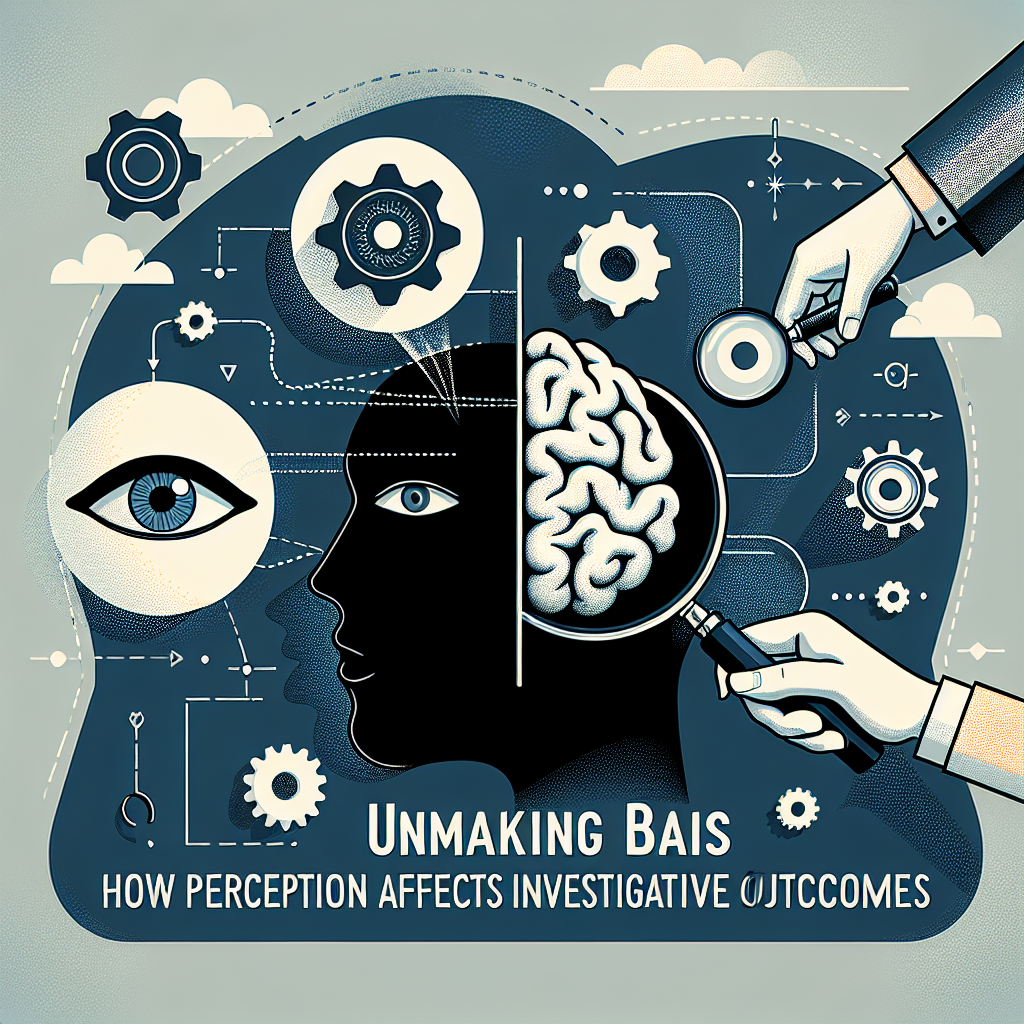Introduction
In a world saturated with information, the ability to perceive reality accurately is more crucial than ever. Unmasking cognitive bias is essential for professionals involved in investigative work, including law enforcement, journalism, and research. Biases can cloud judgment, distort facts, and ultimately, lead to faulty conclusions. This article explores how our perceptions influence investigative outcomes, aiming to equip readers with insights that can dramatically enhance decision-making processes.
Understanding Cognitive Bias
Cognitive bias refers to systematic patterns of deviation from norm or rationality in judgment. They can lead to errors in reasoning, evaluation, and decision-making. Understanding cognitive bias offers a deeper insight into human psychology and the inherent flaws in how we interpret the world.
Common Types of Cognitive Biases
-
Confirmation Bias: The tendency to search for, interpret, and remember information that confirms one’s preconceptions.
- Example: Investigators focusing exclusively on evidence that supports their leading theory while ignoring contradictory evidence.
-
Anchoring Bias: The reliance on the first piece of information received when making decisions.
- Example: An initial suspect being perceived as more likely guilty simply because their name was the first one presented.
-
Availability Heuristic: Overestimating the importance of information readily available in memory.
- Example: An investigator falling prey to a sensational crime story, allowing it to influence their judgment in an unrelated case.
- Hindsight Bias: The “I-knew-it-all-along” phenomenon, where events seem more predictable after they have occurred.
- Example: After a verdict, people believing they knew the outcome all along, overlooking the original ambiguity.
The Role of Perception in Investigative Outcomes
Perception serves as the lens through which we view facts and truths. It acts as a filter, shaping our conclusions based on subjective interpretations rather than objective data. To effectively navigate investigations, professionals must be aware of how cognitive biases shape their perceptions.
Case Studies: Real-World Implications
Case Study 1: The Central Park Five
The infamous case of the Central Park Five exemplifies how cognitive bias can radically distort investigative outcomes. Five teenagers were wrongfully convicted of assaulting a jogger in Central Park due to:
- Pressure on law enforcement to solve a high-profile crime.
- Media portrayal that fueled public perception of their guilt.
Analysis
The confirmation bias among officials—seeking evidence that supported their initial suspicions—led to flawed conclusions. The eventual exoneration of the Central Park Five underscores the critical need for objectivity in investigation and highlights the dangers of perception-driven biases.
Case Study 2: The Challenger Disaster
The Challenger space shuttle disaster is another vivid illustration of the perfect storm of cognitive biases. Engineers and decision-makers ignored warnings about O-ring failures, demonstrating:
- Overconfidence in previous successful missions (optimism bias).
- Groupthink leading to a suppression of dissenting opinions within NASA.
Analysis
Recognizing the dangers of cognitive bias in high-stakes environments is essential to mitigate risks, as this disaster led to the loss of seven lives and significant repercussions for the space program.
Addressing Cognitive Bias in Investigations
Strategies to Mitigate Bias
-
Awareness Training: Regular workshops on cognitive biases can help investigators recognize their impact.
-
Diverse Teams: Forming investigative teams with diverse backgrounds reduces the likelihood of groupthink.
- Structured Decision-Making: Implementing frameworks that guide decision-making processes can help mitigate bias. For example, using checklists can ensure all evidence is considered before concluding a case.
Tools for Objectivity
-
Peer Reviews: Regularly consulting with colleagues to assess findings can bring new perspectives.
- Data-Driven Analysis: Relying on statistical data and using technology to analyze evidence can counteract subjective biases.
Enhancing Critical Thinking
Encouraging critical thinking can significantly enhance the standard of investigations. Tools like mind mapping and SWOT analysis (Strengths, Weaknesses, Opportunities, Threats) can help investigators objectively evaluate situations.
Famous Investigations and Cognitive Bias
Certain investigations have unveiled extraordinary lessons about the impact of cognitive bias:
The Birmingham Six
In this case, six men were wrongfully convicted of carrying out pub bombings in Birmingham due to:
- Confirmation bias from police investigation.
- Intense media pressure that influenced public opinion.
Their eventual release highlighted the catastrophic ramifications of biased perception during investigations.
The O.J. Simpson Trial
The trial of O.J. Simpson was rife with cognitive biases, with:
- Anchoring bias evident in the initial perception of Simpson’s guilt.
- Hindsight bias in public opinion after the outcome.
This trial serves as a case study in media influence and cognitive biases, demonstrating how they can sway jurors and public sentiment alike.
Conclusion
Unmasking cognitive bias is crucial for ensuring the integrity of investigative outcomes. By understanding and addressing how perception affects judgment, professionals can make more informed, objective decisions. It is imperative to embrace training, support diverse perspectives, and apply structured methodologies to combat biases that can derail justice.
Takeaway
Cognitive bias is not just an academic concept; it has real consequences in the field. Embracing these insights can transform investigative processes, leading to fairer, more accurate outcomes. Being aware of one’s own biases is the first step toward reducing their impact.
FAQs
1. What is cognitive bias?
Cognitive bias refers to systematic patterns of deviation from norm or rationality in judgment, leading to illogical conclusions.
2. How does cognitive bias affect investigations?
Biases can distort perceptions, leading to wrongful conclusions or overlooking critical evidence, jeopardizing the integrity of an investigation.
3. What are some common types of cognitive bias?
Common types include confirmation bias, anchoring bias, and availability heuristic.
4. How can cognitive bias be mitigated in investigations?
Through awareness training, forming diverse investigative teams, and implementing structured decision-making models.
5. Are there case studies that highlight the impact of cognitive bias?
Yes, cases like the Central Park Five and the Challenger disaster exemplify how cognitive bias can lead to tragic outcomes when investigators are influenced by their perceptions.
By delving into the nature of cognitive biases and their impact on perceptions in investigative contexts, we not only enhance our understanding but pave the way for improvements in accuracy and justice.

